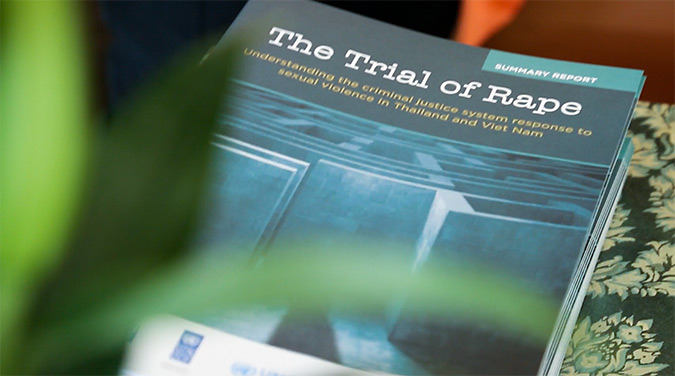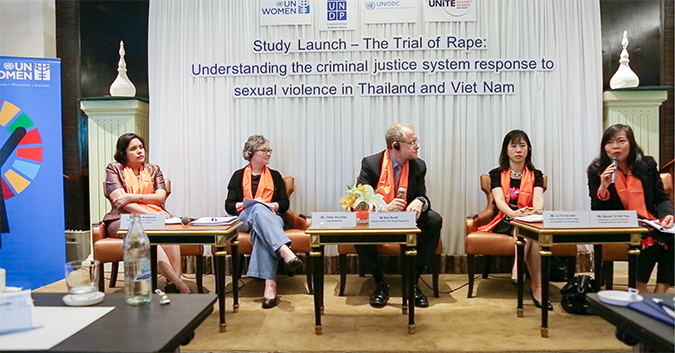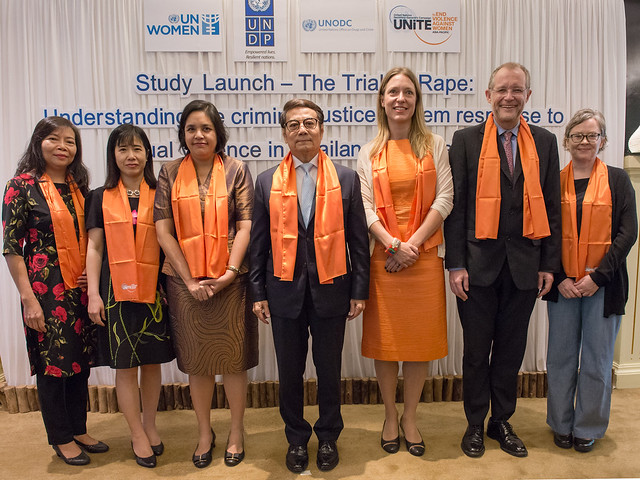UN study sheds new light on discrimination against rape victims
Date:

Joint Press Release
For immediate release
Bangkok, Thailand — Most sexual assault victims in Thailand and Viet Nam face serious challenges obtaining justice, in part because discriminatory attitudes and practices push them out at every stage of the justice process from initial reporting to trial, a new United Nations study has found.

The 109-page study, 'The Trial of Rape: Understanding the criminal justice system response to sexual violence in Thailand and Viet Nam,' was released today by UN Women, United Nations Development Programme (UNDP) and United Nations Office on Drugs and Crime (UNODC). It is the first such comparative study in the Asia-Pacific region.
The study analysed how the criminal justice systems in the two countries respond to reported cases of rape and sexual assault of women. In total, the researchers reviewed 290 police or court case files and interviewed 213 people including government officials, judicial personnel, civil society activists, and providers of services to survivors.
The study focused on better understanding of attrition -- the process by which cases fail to proceed through the justice system, from the stage of filing the initial complaint, to investigations, to the decision whether to prosecute, and finally to the trial stage. It found that sexual assault survivors face significant societal, legal, and institutional policies and practices contributing to high attrition rates. These include stereotypes about sexual assaults and how survivors are expected to look and behave, informal settlements of complaints, frequent insensitive treatment of victims, and prolonged court proceedings which are often not sensitive to the traumatic experiences that sexual assault survivors endure.
The report was released at an event at Dusit Thani Hotel, Bangkok, Thailand. In the report, Nidd , a Thai rape survivor, bravely spoke about her attempt to successfully obtain justice, "I had to go through all the painful experiences," she said. "It was a complex process. I could not understand most of the legal documents that were sent to me, such as the letter from the prosecutor's office and the court. The system is not women-friendly. But I couldn't surrender just because of that. I continued to fight for my rights, for the justice that I deserve."

Anna-Karin Jatfors, Deputy Regional Director of UN Women’s Regional Office for Asia and the Pacific, said: “The study found that there are pervasive barriers to justice for survivors of sexual assault that stem from not only difficulties in getting assistance, but also in the attitudes and biases of the police and justice officials tasked with providing assistance. Understanding what the barriers to justice are is a crucial first step to delivering justice to women and ending the widespread impunity in sexual violence. We hope this study will become an entry point for change in both countries.”
Valerie Cliff, UNDP’s Deputy Regional Director for Asia and the Pacific, said: “Sexual violence is one of the most serious human rights violations women face, and it must be a priority for justice systems. This study highlights the limitations in referral networks and coordination mechanisms within the justice system, and with health and social welfare services, which prevent survivors of sexual violence getting the justice they deserve. Joined-up justice services are essential to overcome the challenge of impunity.”
Claudia Baroni, UNODC’s Drug Control and Crime Prevention Officer, said: “Addressing gender-stereotyping and gender biases in the justice system is critical to solve this issue. Decisions by the police and judicial actors should be based on an unprejudiced consideration of the evidence presented and not on biased attitudes about women, such as beliefs that some women may deserve to be raped, or that a rape might be the woman’s fault. Ensuring well-functioning justice systems is not only a prerequisite for ensuring gender equality and women’s empowerment, but is essential for the rule of law and for sustaining just, peaceful and prosperous societies for all.”
The findings of this study reveal that the main factors in reported rape cases contradict several commonly held myths and beliefs about rape. These findings have important implications related to how justice systems handle sexual crimes and approach victims of sexual violence. Strong engagement from the Governments of Thailand and Viet Nam in the research, thereby improving our shared understanding of the barriers in the administration of justice and where to focus efforts to address them, is a key strength of the study.
Snapshots of key findings from the research, are as follows:
- Social factors that impact access to justice and influence attrition: There is wide acceptance of myths about women and girls, and how sexual assaults and rape happen, which interfere in women's and girls' ability to seek justice and have their cases taken seriously. Examples of these myths include:
- Myth: 'Real rape' involves strangers, force, physical injury and occurs in public.
- Finding: Most victims and suspects of sexual crimes know each other. The majority of cases reviewed had no documentation of physical injury, and the majority of reported sexual assaults happen in homes or hotels.
- Myth: Rape and sexual violence are only a problem when it happens to 'good' or 'innocent' women and girls.
- Finding: While rape can happen to anyone, the study found that many criminal justice providers hold beliefs about the 'ideal' sexual assault victim. For example, the 'ideal victim' should demonstrate intense fear, helplessness, horror or strong emotions. Victims who recount their experiences in a cold or detached manner do not fit the idea of appropriate behavior and therefore their stories are not seen as credible.
- Myth: Some women deserve to be raped and sexually assaulted; it is their own fault.
- Finding: Women were often blamed for the sexual violence they suffered for reasons from being thought to be a 'sex worker', to dressing provocatively, going out in the evening with a man, or being alone on a bus at night.
- Legal and institutional factors influencing attrition: These barriers, in turn, can inhibit reporting of sexual violence and reduce the likelihood that a woman will persist in seeking redress through the criminal justice system.
- From the case file analysis, the research found an example of one victim who went to the police station more than 10 times for her case to be able to proceed.
- Legal and procedural factors relating to criminal procedural processes and impact on attrition: In both countries, attrition occurred at all stages of the criminal justice process - reporting/initial contact stage; investigation stage; pre-trial stage; and trial stage.
Read the full study here: http://unwo.men/X9zQ30eUMul
Media Inquiries:
Montira Narkvichien
Regional Communications Specialist, UN Women
M: 081 6688900 | Email: montira.narkvichien@unwomen.org
Mahtab Haider
Communications Specialist, UNDP
Email: mahtab.haider@undp.org
Note to Editors:
* Victims used in the full report, the summary or in the press release irrespective of the outcome of the case, so includes complainants. Victim means a person recorded as the victim of sexual offence, including those cases subsequently deemed no offence or false allegations. The term "victim" used as this is the common terminology for analysis of criminal justice data and is not intended to negate other terms such as "survivors".
About UN Women
UN Women, or the United Nations Entity for Gender Equality and the Empowerment of Women, works to eliminate discrimination against women and girls, to empower women, and to achieve equality between women and men.
About UNDP
UNDP connects countries to knowledge, experience and resources so people can build a better life. It helps countries attract foreign aid and use it effectively. In all its activities, UNDP promotes gender equality and human rights.
About UNODC
UNODC is a global leader in the fight against illicit drugs and crime. UNODC integrates a gender perspective in its work, particularly in its projects to provide alternative livelihoods and to stop human trafficking.
About UNiTE Campaign
In support of this civil society initiative, each year, the United Nations Secretary-General's campaign UNiTE to End Violence against Women (UNiTE) calls for global action to increase worldwide awareness and create opportunities for discussion about challenges and solutions of ending violence against women. UNiTE is an UN interagency campaign, with UN Women as the coordinating agency. In 2010, UNiTE Campaign launched the regional campaign in the Asia-Pacific region. In recent years, the UNiTE campaign has utilized the colour orange as a unifying theme running through all of its global activities. Orange is one of the official colours of the UNiTE campaign, as conceptualised by the Asia-Pacific UNiTE Youth Network. In the context of its global advocacy, the orange colour used as a symbol of a brighter future without violence against women and girls.

ข่าวประชาสัมพันธ์
ผลการศึกษายูเอ็นเปิดมุมมองใหม่เกี่ยวกับการเลือกปฏิบัติต่อผู้เสียหายในคดีข่มขืน
กรุงเทพ, ประเทศไทย — การศึกษาใหม่ของสหประชาชาติพบว่า ผู้เสียหายจากการถูกข่มขืนส่วนใหญ่ในประเทศไทยและประเทศเวียดนาม เผชิญหน้ากับอุปสรรคสำคัญในการเข้าถึงความยุติธรรม ซึ่งด้านหนึ่งเป็นเพราะทัศนคติและแนวปฏิบัติเกี่ยวกับการเลือกปฏิบัติ ที่กีดกันผู้เสียหายออกจากกระบวนการยุติธรรมทุกขั้นตอน นับตั้งแต่เริ่มแจ้งความเพื่อเข้าสู่การพิจารณาคดี

รายงานการศึกษาความยาว 109 หน้า เรื่อง "การพิจารณาคดีข่มขืน: ความเข้าใจเรื่องการตอบสนองของกระบวนการยุติธรรมทางอาญาต่อความรุนแรงทางเพศในประเทศไทยและประเทศเวียดนาม" ที่นำมาเปิดเผยวันนี้ (29พ.ย.) จัดทำโดยองค์การเพื่อการส่งเสริมความเสมอภาคระหว่างเพศและเพิ่มพลังของผู้หญิงแห่งสหประชาชาติ (United Nations Entity for Gender Equality and the Empower of women- UN Women), โครงการพัฒนาแห่งสหประชาชาติ (United Nations Development Programme - UNDP) และ สำนักงานป้องกันยาเสพติดและปราบปรามอาชญากรรมแห่งสหประชาชาติ (United Nations Office on Drugs and Crime - UNODC) ซึ่งถือเป็นการศึกษาเปรียบเทียบประเด็นดังกล่าวครั้งแรกสุดในภูมิภาคเอเชียแปซิฟิก
การศึกษามุ่งวิเคราะห์ว่า กระบวนการยุติธรรมทางอาญาในประเทศไทยและประเทศเวียดนาม มีการตอบสนองอย่างไรต่อคดีข่มขืนและการกระทำความรุนแรงทางเพศต่อผู้หญิงที่ได้รับการแจ้งความ โดยทีมผู้วิจัยได้ทบทวนแฟ้มคดีจากตำรวจและศาลจำนวน 290 คดี และสัมภาษณ์บุคคล 213 ราย รวมถึงเจ้าหน้าที่ภาครัฐ ผู้ปฎิบัติงานฝ่ายตุลาการ นักเคลื่อนไหวภาคประชาสังคม และบุคคลผู้ให้บริการความช่วยเหลือต่างๆแก่ผู้เสียหาย
การศึกษามุ่งเน้นไปที่การทำความเข้าใจให้กระจ่างชัดขึ้นในเรื่องการลดทอนจำนวนคดี ซึ่งหมายถึงการล้มคดีหรือการยอมความ อันเป็นกระบวนการที่ทำให้คดีไม่สามารถเข้าสู่ระบบยุติธรรม นับจากขั้นตอนร้องทุกข์ ไปจนถึงขั้นตอนการสืบสวนสอบสวน ขั้นตอนการตัดสินใจของเจ้าหน้าที่ว่าจะฟ้องคดีหรือไม่ และขั้นสุดท้ายคือการพิจารณาคดีในศาล โดยการศึกษาพบว่า ผู้เสียหายจากความรุนแรงทางเพศ ต้องเผชิญกับแนวปฎิบัติและนโยบายต่างๆ ทางสังคม ทางกฎหมาย และทางสถาบันอย่างมีนัยสำคัญซึ่งนำไปสู่การลดทอนคดีในอัตราที่สูง ปัจจัยดังกล่าว ยังรวมถึงทัศนคติทั่วไปเกี่ยวกับความรุนแรงทางเพศและความเชื่อของสังคมเกี่ยวกับบุคลิกและพฤติกรรมของผู้เสียหาย ไปจนถึงการไกล่เกลี่ยยอมความนอกศาล การปฏิบัติอย่างไม่ละเอียดอ่อนต่อผู้เสียหายซึ่งเกิดขึ้นเป็นประจำ ตลอดจนความหน่วงเหนี่ยวล่าช้าของกระบวนการพิจารณาคดีในชั้นศาล ซึ่งบ่อยครั้งไม่มีความละเอียดอ่อนต่อประสบการณ์ความบอบช้ำทางจิตใจที่ผู้เสียหายจากการถูกข่มขืนจำต้องอดทน
รายงานผลการศึกษาดังกล่าว จะได้รับการเปิดเผยในการแถลงข่าวที่โรงแรมดุสิตธานี กรุงเทพฯ โดยในรายงานนี้ "นิด (นามสมมุติ)" ผู้เสียหายจากคดีข่มขืนชาวไทย ได้บอกเล่าอย่างอาจหาญถึงความพยายามของเธอจนประสบผลสำเร็จในการเข้าถึงความยุติธรรม
"ฉันต้องก้าวผ่านทุกประสบการณ์ที่เจ็บปวด" เธอกล่าว "มันเป็นกระบวนการที่ซับซ้อน ฉันไม่สามารถเข้าใจเอกสารทางกฎหมายส่วนใหญ่ที่พวกเขาส่งมาให้ฉัน เช่น จดหมายจากสำนักงานอัยการและศาล กระบวนการของมันไม่ง่ายสำหรับผู้หญิง แต่ฉันก็ไม่สามารถยอมแพ้เพียงเพราะมันเป็นเช่นนี้ ฉันเดินหน้าต่อสู้เพื่อสิทธิของฉัน เพื่อความยุติธรรมที่ฉันควรได้รับ" คุณนิด กล่าว
ทางด้านนางสาว แอนนา คาริน จัตฟอร์ส รองผู้อำนวยการยูเอ็นวีเมน สำนักงานประจำภูมิภาคเอเชียและแปซิฟิกกล่าวว่า "ผลการศึกษาพบว่ามีอุปสรรครอบด้านในการเข้าถึงความยุติธรรมของผู้เสียหายจากการถูกกระทำความรุนแรงทางเพศ ซึ่งไม่ใช่เพียงความยากลำบากที่จะเข้าถึงความช่วยเหลือต่างๆ หากยังมีเรื่องทัศนคติและอคติของเจ้าหน้าที่ตำรวจและผู้ปฏิบัติงานฝ่ายตุลาการซึ่งมีหน้าที่ให้ความช่วยเหลืออีกด้วย การทำความเข้าใจว่าอะไรคืออุปสรรคต่อการเข้าถึงความยุติธรรม เป็นก้าวแรกที่สำคัญมากในการส่งมอบความยุติธรรมให้แก่ผู้หญิงและเป็นการยุติพฤติกรรมลอยนวลของผู้กระทำรุนแรงทางเพศที่เกิดขึ้นอย่างแพร่หลาย เราหวังว่า ผลการศึกษานี้ จะเป็นจุดเริ่มต้นของการเปลี่ยนแปลงทั้งในประเทศไทยและประเทศเวียดนาม"
นางสาว วาเลอรี คลิฟฟ์ รองผู้อำนวยการโครงการพัฒนาแห่งสหประชาชาติภูมิภาคเอเชียแปซิฟิกให้ความเห็นว่า
"ความรุนแรงทางเพศเป็นหนึ่งในความรุนแรงทางสิทธิมนุษยชนขั้นร้ายแรงที่สุดที่ผู้หญิงเผชิญ และเรื่องนี้ต้องอยู่ในลำดับความสำคัญของกระบวนการยุติธรรม สำหรับการศึกษานี้เน้นไปที่ข้อจำกัดต่างๆในเครือข่ายบอกต่อและกลไกความร่วมมือภายในกระบวนการยุติธรรม รวมถึงบริการสวัสดิการและสุขภาพ ซึ่งช่วยปกป้องผู้เสียหายจากการถูกกระทำรุนแรงทางเพศให้ได้รับความยุติธรรมที่ผู้เสียหายสมควรได้รับ บริการร่วมด้านความยุติธรรมมีความสำคัญต่อการเอาชนะความท้าทายในการเปลี่ยนแปลงวัฒนธรรมลอยนวลพ้นผิด"
นางสาว คลอเดีย บาโรนิ เจ้าหน้าที่ป้องกันอาชญากรรมและยุติธรรมอาญา กล่าวว่า "การจัดการกับปัญหาอคติทางลักษณะเฉพาะประจำเพศและเพศสภาวะในกระบวนการยุติธรรมเป็นวิกฤตที่ต้องแก้ไข การตัดสินใจโดยเจ้าหน้าที่ตำรวจและเจ้าหน้าที่ฝ่ายตุลาการ ควรอยู่บนพื้นฐานการพิจารณาอย่างเที่ยงธรรมตามหลักฐานที่ปรากฏ และไม่อยู่บนพื้นฐานทัศนคติที่มีความลำเอียงเกี่ยวกับผู้หญิง เช่น มีความเชื่อว่า สมควรแล้วที่ผู้หญิงบางคนจะถูกข่มขืน หรือ การข่มขืนอาจเป็นความผิดของผู้หญิง การสร้างความมั่นใจว่ากระบวนการยุติธรรมจะทำงานได้ดี มิใช่เพียงแต่ต้องสร้างความมั่นใจเรื่องความเท่าเทียมทางเพศสภาวะและการเพิ่มพลังของผู้หญิงขึ้นก่อนเท่านั้น หากยังจำเป็นสำหรับหลักนิติธรรม และเพื่อธำรงรักษาสังคมที่มีความเป็นธรรม มีสันติสุข และเจริญรุ่งเรืองสำหรับทุกคนอย่างยั่งยืน"
ผลการศึกษาชี้ด้วยว่า ปัจจัยหลักในคดีข่มขืนที่ได้รับการแจ้งความ ขัดแย้งกับความเชื่อและมายาคติหลายประการเกี่ยวกับการข่มขืนซึ่งเป็นที่ยึดถือกันโดยทั่วไป ข้อค้นพบทั้งหมดมีนัยสำคัญที่เชื่อมโยงกับวิธีจัดการของกระบวนการยุติธรรมต่ออาชญากรรมทางเพศและต่อผู้เสียหายที่ถูกกระทำรุนแรงทางเพศ เนื้อหาหลักของการศึกษายังได้กล่าวถึงการมีส่วนร่วมอย่างแข็งขันของรัฐบาลไทยและเวียดนามในการศึกษานี้ ซึ่งด้วยเหตุนี้ ได้ช่วยยกระดับความเข้าใจร่วมเกี่ยวกับอุปสรรคในการบริหารงานยุติธรรมอันเป็นเป้าหมายของการทุ่มเทความพยายามเพื่อจัดการปัญหา
ประเด็นการค้นพบที่สำคัญจากการศึกษาโดยย่อ:
ปัจจัยทางสังคมที่ส่งผลกระทบต่อการเข้าถึงความยุติธรรมและที่มีอิทธิพลต่อการลดทอนจำนวนคดี:
มีมายาคติที่ได้รับการยอมรับอย่างกว้างขวางเกี่ยวกับผู้หญิงและเด็ก รวมถึงเหตุการณ์ข่มขืนและการถูกกระทำความรุนแรงทางเพศ ซึ่งเป็นอุปสรรคต่อความสามารถของผู้หญิงและเด็กหญิงในการแสวงหาความยุติธรรมและในการทำให้คดีของพวกเธอได้รับการพิจารณาอย่างจริงจัง ตัวอย่างของมายาคตินี้เช่น
มายาคติ: "การข่มขืนที่แท้จริง" เกี่ยวข้องกับคนแปลกหน้า การใช้กำลังบังคับ อาการบาดเจ็บทางกาย และเกิดขึ้นในที่สาธารณะ
ข้อค้นพบ: ผู้เสียหายและผู้ต้องสงสัยในคดีอาชญากรรมทางเพศโดยมากรู้จักซึ่งกันและกัน คดีส่วนใหญ่ไม่มีเอกสารบันทึกเกี่ยวกับอาการบาดเจ็บทางกาย และส่วนใหญ่ของคดีกระทำรุนแรงทางเพศที่มีการแจ้งความเกิดขึ้นที่บ้านหรือในโรงแรม
มายาคติ: การข่มขืนและความรุนแรงทางเพศเป็นปัญหาก็ต่อเมื่อเกิดขึ้นกับผู้หญิงและเด็กหญิงที่ "มีความประพฤติดี" หรือ "บริสุทธิ์"
ข้อค้นพบ: ขณะที่การข่มขืนสามารถเกิดขึ้นกับใครก็ได้ การศึกษาพบว่าผู้ให้บริการด้านงานยุติธรรมทางอาญา มีความเชื่อเกี่ยวกับ "ผู้เสียหาย/เหยื่อจากความรุนแรงทางเพศ" ในเชิง "มโนคติ" ตัวอย่างเช่น "ผู้เสียหายในมโนคติ" ควรแสดงอาการหวาดกลัว, ช่วยเหลือตัวเองไม่ได้, ผวา หรือมีอารมณ์ตื่นเต้นตกใจอย่างรุนแรง ผู้เสียหายที่บอกเล่าประสบการณ์ของตนด้วยท่าทีเย็นชาหรือถอนอารมณ์ออกจากประสบการณ์ ไม่เข้ากับพฤติกรรมที่เหมาะสมของผู้เสียหายตามมโนคติ ดังนั้น เรื่องราวที่พวกเธอเล่าจึงไม่น่าเชื่อถือ
มายาคติ: ผู้หญิงบางคนสมควรถูกข่มขืนและถูกกระทำความรุนแรงทางเพศ เป็นความผิดของพวกผู้หญิงเอง
ข้อค้นพบ: บ่อยครั้งผู้หญิงต้องทนทุกข์กับการถูกกล่าวหาว่าเป็นเหตุของความรุนแรงทางเพศเนื่องจากเหตุที่ว่าพวกเธอถูกมองเป็น "ผู้ขายบริการทางเพศ" ด้วยการแต่งกายยั่วยวน ออกไปข้างนอกกับผู้ชายในเวลาค่ำมืดหรืออยู่ตามลำพังบนรถโดยสารในเวลากลางคืน
ปัจจัยทางกฎหมายและปัจจัยเชิงสถาบันที่ส่งอิทธิพลต่อการลดทอนจำนวนคดี:
อุปสรรคเหล่านี้ สามารถยับยั้งการรายงานการกระทำความรุนแรงทางเพศ และลดทอนความเป็นไปได้ที่ผู้หญิงจะยืนหยัดในการแสวงหาการชดเชยผ่านกระบวนการยุติธรรมทางอาญา
จากการวิเคราะห์คดีในแฟ้มคดี ผลการศึกษาพบตัวอย่างผู้เสียหายรายหนึ่ง ซึ่งต้องเดินทางไปสถานีตำรวจมากกว่า 10 ครั้งเพื่อให้คดีของเธอสามารถเข้าสู่กระบวนการยุติธรรม
ปัจจัยทางกฎหมายและปัจจัยเชิงกระบวนการที่เกี่ยวข้องกับกระบวนการวิธีพิจารณาความอาญา:
ทั้งในประเทศไทยและประเทศเวียดนาม การลดทอนคดีด้วยการยอมความหรือล้มคดีเกิดขึ้นในทุกขั้นตอนของกระบวนการยุติธรรมทางอาญา ประกอบด้วยขั้นตอนการแจ้งความ/การติดต่อในเบื้องต้น ขั้นตอนการสืบสวนสอบสวน ขั้นตอนก่อนพิจารณาคดีและขั้นตอนพิจารณาคดี
อ่านรายงานการศึกษาฉบับเต็มได้ที่ http://asiapacific.unwomen.org/en/digital-library/publications/2017/09/the-trial-of-rape
สอบถามข้อมูลเพิ่มเติมสำหรับสื่อ:
มณฑิรา นาควิเชียร
เจ้าหน้าที่ผู้ชำนาญการสื่อสารประจำภูมิภาคเอเชีย และแปซิฟิก, ยูเอ็นวีเมน
M: 081 6688900 | Email: montira.narkvichien@unwomen.org
Mahtab Haider
ผู้เชี่ยวชาญการสื่อสาร, ยูเอ็นดีพี
Email: mahtab.haider@undp.org
ข้อความถึงบรรณาธิการ :
* คำว่า ผู้เสียหาย ที่ใช้ในรายงานฉบับเต็ม ในบทสรุปสำหรับผู้บริหารหรือข่าวแจก มิได้คำนึงถึงผลของคดี และรวมถึงโจทก์ ผู้เสียหายหมายถึงบุคคลซึ่งได้รับการบันทึกว่าเป็นผู้เสียหายจากการถูกกระทำผิดเกี่ยวกับเพศ รวมถึงคดีอื่นๆ ที่ตามมาเหล่านั้นที่ได้รับการพิจารณาว่าไม่มีความผิดหรือเป็นข้อกล่าวหาเท็จ ในที่นี้ "ผู้เสียหาย" เป็นคำเฉพาะสำหรับการวิเคราะห์ข้อมูลทางด้านยุติธรรมอาญาและมิได้เจตนาที่จะปฏิเสธคำอื่นๆ เช่น "ผู้รอดชีวิต"
เกี่ยวกับ ยูเอ็น วีเมน (UN Women)
ยูเอ็นวีเมน หรือ องค์การเพื่อการส่งเสริมความเสมอภาคระหว่างเพศและเพิ่มพลังของผู้หญิงแห่งสหประชาชาติ ทำงานเพื่อกำจัดการเลือกปฏิบัติต่อผู้หญิงและเด็กหญิง เพื่อเพิ่มพลังของผู้หญิงและเพื่อสร้างความเท่าเทียมกันระหว่างผู้หญิงกับผู้ชาย
เกี่ยวกับโครงการพัฒนาแห่งสหประชาชาติ (United Nations Development Programme - UNDP)
UNDP ติดต่อกับหลายประเทศเพื่อให้ความรู้ ประสบการณ์และทรัพยากร โดยมุ่งหวังให้ประชาชนสามารถสร้างชีวิตที่ดีขึ้น ยูเอ็นดีพีช่วยให้หลายประเทศได้รับความช่วยเหลือจากต่างประเทศและใช้ความช่วยเหลือนั้นอย่างมีประสิทธิภาพ ในกิจกรรมทั้งหมดนี้ ยูเอ็นดีพีสนับสนุนความเท่าเทียมทางเพศและสิทธิมนุษยชน
เกี่ยวกับ สำนักงานป้องกันยาเสพติดและปราบปรามอาชญากรรมแห่งสหประชาชาติ (United Nations Office on Drugs and Crime - UNODC)
UNODC คือผู้นำระดับนานาชาติในการต่อสู้กับยาเสพติดและอาชญากรรม UNODC ได้รวมเอามุมมองด้านเพศภาวะเข้ามาเป็นส่วนหนึ่งของงาน โดยเฉพาะอย่างยิ่งในโครงการของ UNODC ซีเพื่อการดำรงชีวิตแบบทางเลือกและเพื่อยุติการค้ามนุษย์
เกี่ยวกับ การรณรงค์ UNiTE
เพื่อสนับสนุนความคิดริเริ่มนี้ของภาคประชาสังคม ในแต่ละปี สำนักงานเลขาธิการแห่งสหประชาชาติจะรณรงค์ UNiTEเพื่อยุติความรุนแรงต่อผู้หญิง โดยเรียกร้องปฏิบัติการระดับโลกเพื่อขยายความตระหนักรู้ในวงกว้างและสร้างโอกาสในการการถกเถียงเกี่ยวกับความท้าทายและทางออกที่จะยุติความรุนแรงต่อผู้หญิง UNiTE คือการณรงค์ร่วมกันของหน่วยงานภายในสหประชาชาติ โดยมียูเอ็นวีเมน เป็นองค์กรหลักในการประสานงาน เมื่อปี พ.ศ 2553 UNiTE ได้เริ่มโครงการรณรงค์ระดับภูมิภาคในภาคพื้นเอเชียแปซิฟิก และไม่กี่ปีก่อนหน้านี้ โครงการรณรงค์ของ UNiTE ได้นำสีส้มมาใช้เป็นสีหลักในการทำกิจกรรมต่างๆ ที่เกิดขึ้นทั่วโลก สีส้มเป็นหนึ่งในสีทางการของโครงการรณรงค์ UNiTE ตามกรอบคิดของเครือข่ายเยาวชน UNiTE ภาคพื้นเอเชียแปซิฟิก ในบริบทการสนับสนุนทางสากลของ UNiTE สีส้มคือสัญลักษณ์ของอนาคตสดใสที่ปราศจากความรุนแรงต่อผู้หญิงและเด็กหญิง
